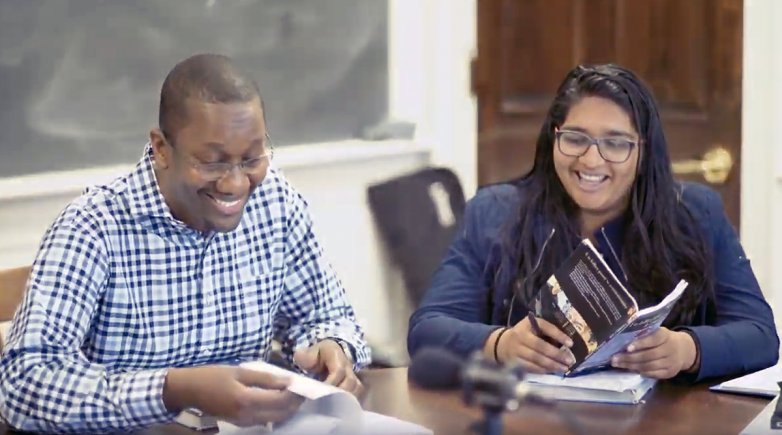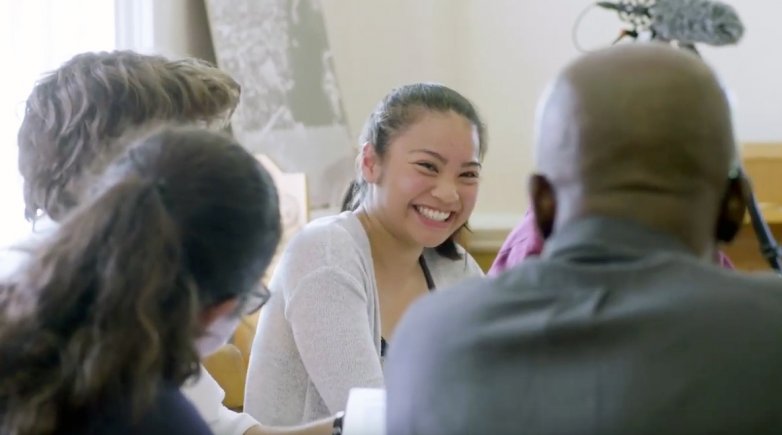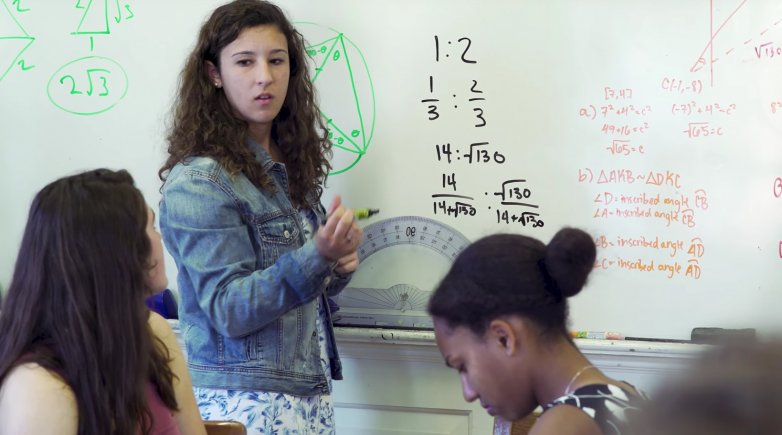Sierra was seeking to improve the college performance, graduation rate and career success of Noble alumni, wrote Lincoln Caplan ’68 in The American Scholar in 2016. By 2018, when Noble’s founding class graduated, members of that class had achieved a 63 percent projected college graduation rate — the highest in network history.
As the current Bates-Russell professor, Foley teaches a half-load of classes for the History Department and serves as the point person for Harkness Outreach, fielding inquiries from educators at all levels, elementary through postsecondary, in all kinds of schools. Foley welcomed the challenge, as she had long been curious to see how student-led, discussion-based learning could look in places very different from Exeter.
“It’s kind of a no-brainer that it could work in a place like this,” she says. “To me, the interesting question is, can the core philosophy of Harkness be adopted to places that aren’t as resource-rich?”
Harkness at Isaac Newton Academy
“One of the benefits of the Harkness method is that it causes you to prepare,” says Gerard Griffin ’86. “You know you’re going to be exposed if you don’t.”
Griffin, who founded the London-based hedge fund Tisbury Capital Management and now works as managing director at QRails, had this type of accountability in mind when it came time to plan the curriculum at Isaac Newton Academy (INA), which opened in 2012 in Ilford, east London. Part of the United Kingdom’s state school system, an academy such as Isaac Newton functions like a U.S. charter school. As INA’s founding sponsor and chair of the board of governors, Griffin — like Pablo Sierra at Noble — saw Harkness as a vital part of empowering the school’s students to take charge of their own learning.
Before INA opened, Griffin and his founding principal, Rachel Macfarlane, who is no longer with the school, traveled to Exeter and met with Ron Kim P’18, P’20, then dean of faculty. “To make the numbers work, my average class size was 25 to 30,” Griffin says. “There was also a lot of pressure on all the teachers to get through curriculums and cover materials. So the question was, how do I incorporate as much as I can of Harkness into this system where I’ve got these curricular ... and budgetary constraints?”
Kim helped Griffin and Macfarlane work out how the Harkness spirit could be implemented at INA, even without an oval table in every classroom. They ordered a single Harkness table to be installed in the school’s library, with each class meeting there roughly once a term; movable furniture in every classroom allows for Harkness-style arrangements on a regular basis. Every year, two teachers travel to Exeter to observe lessons and speak to staff here, while six INA students go to Exeter Summer, the nation’s longest-running summer education program. All of them are tasked with bringing back the insights they gained and sharing them with their peers.
“What I’m trying to do is create a grassroots belief and excitement about the Harkness method to counterbalance the skepticism of teachers about this American system invented at a private school in New Hampshire,” Griffin explains. “Anyone who gets exposed to the Harkness method, particularly in its manifestation at Exeter, comes away believing in it.”
Abbott-Jones, the school’s vice principal, was one of the first INA educators to travel to Exeter; she later returned to teach physical education in the Exeter Summer program. For her master’s dissertation on the value of Harkness methods, Abbott-Jones incorporated the experiences of the first group of Harkness Champions, as the INA students who attend Exeter Summer are known.
“They wrote reflective diaries about their learning,” she says. “How it felt for them to be around the table, what happened when it became silent, how they best prepared themselves for learning, [and] what made a really excellent question.”
The role of the Harkness Champions is key to the progress of discussion-based teaching at Isaac Newton, which now serves about 1,200 11- to 18-year-old students in its secondary school. A primary school opened in 2014. The champions meet with their teachers to plan lessons, and help introduce younger students to skills such as making eye contact, listening and taking notes, and even leading discussions themselves so that bigger classes can be broken up into smaller groups.
“People always comment on how confident our students are in terms of conversation, how articulate they are as learners,” Abbott-Jones says. “I think that really comes from empowering them to have a voice and lead their learning using the Harkness method.”
Harkness at Pinkerton Academy
Founded in 1814, Pinkerton Academy in Derry, New Hampshire, is a private school that also serves as the public high school for six towns: Auburn, Candia, Chester, Derry, Hampstead and Hooksett. With some 3,300 students and more than 500 employees, it is the nation’s largest independent high school.
At Pinkerton, Harkness is one of several instructional practices used to increase students’ efficacy and engagement, explains Kirsten Soroko, the school’s curriculum and instruction coordinator. As a longtime teacher of middle school English and language arts, she had used Harkness and other discussion-based techniques in the past but knew it would be a challenge to implement them at Pinkerton.
“For a traditional high school, using Harkness or other inquiry-based spaces is a shift,” Soroko says. To confront this challenge, she reached out to Exeter and began working with Foley, who for the past two summers has helped train 60 Pinkerton teachers in Harkness for the humanities and STEM.
Pinkerton also trains teachers in two other research-based instructional methods: reciprocal teaching and the Question Formulation Technique (QFT), both of which Soroko says help “build us toward Harkness.” In reciprocal teaching, students take on specific roles, such as clarifier or questioner, in smaller group discussions within a class. “As these kids develop the skill sets that are under their role, they’re learning how to facilitate this small-group discussion and look at purpose and intent or focus within that discussion,” Soroko explains. With QFT, a strategy originally developed by the Right Question Institute, students focus on learning to form their own questions and on using those questions to pave their own learning path.
Because Pinkerton’s class sizes are larger than Exeter’s, with 20 to 28 students, “We might end up breaking up into two Harkness circles and having kids facilitate those discussions,” Soroko says. “But they need to be trained on how to do that first.”
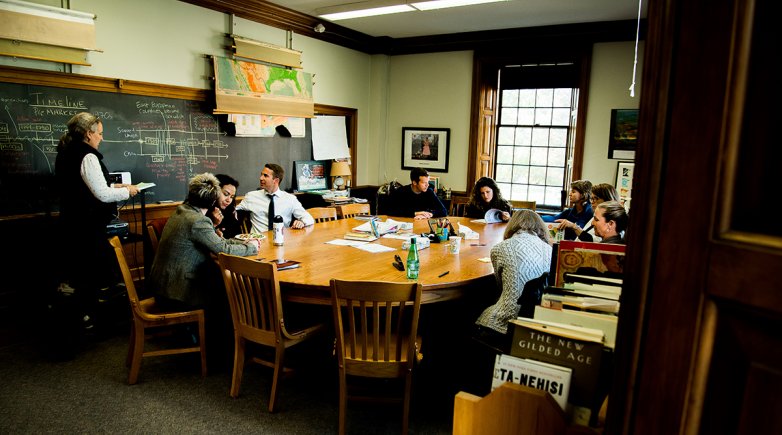
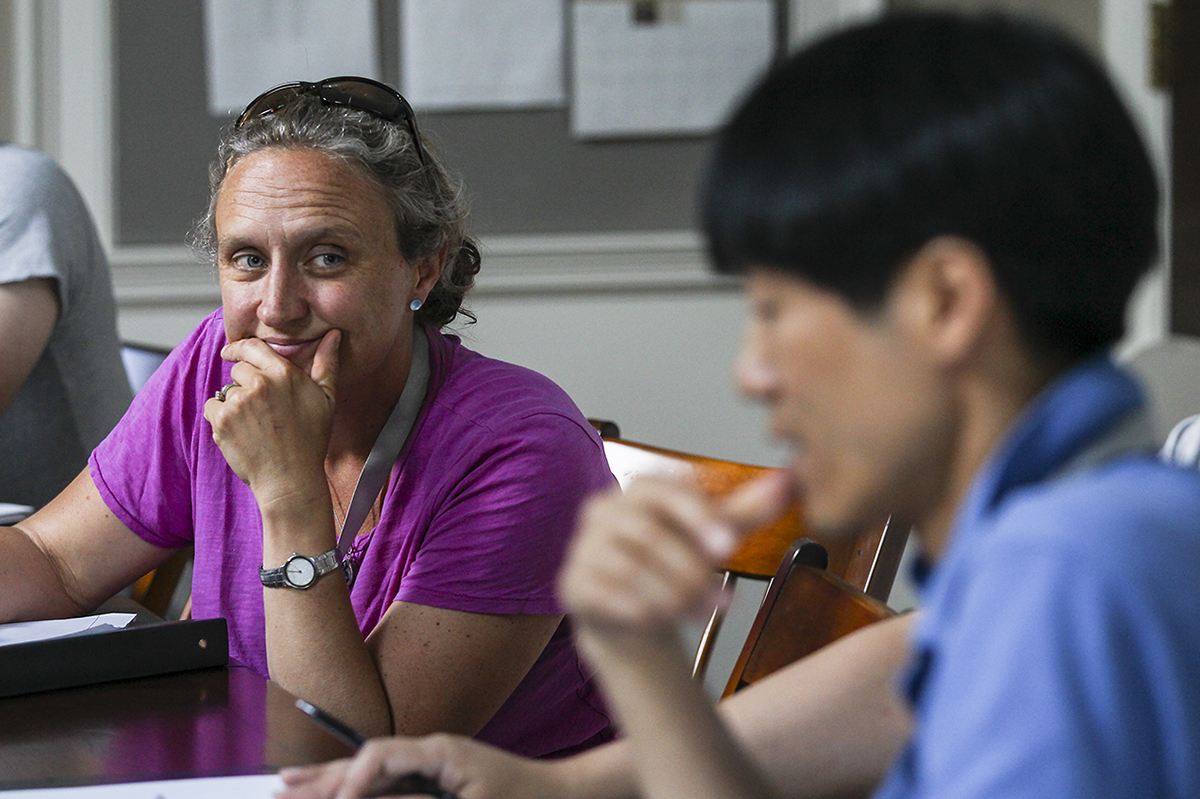
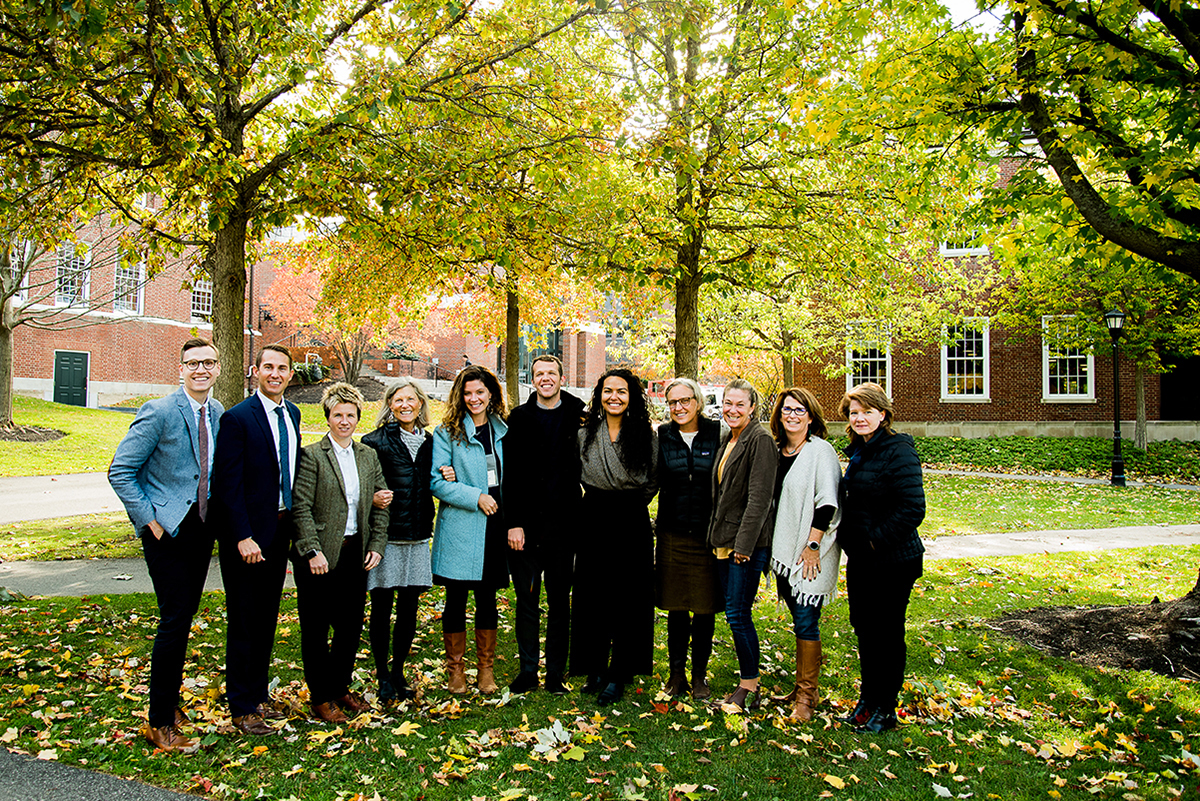 Soroko emphasizes the feeling of connecting for the first time with fellow educators from far-flung schools. “It was lovely just hearing stories of their journey and struggles, victories, things that they’ve come up with,” she says. “The stories were similar, even though the people at the table were extremely diverse.”
Soroko emphasizes the feeling of connecting for the first time with fellow educators from far-flung schools. “It was lovely just hearing stories of their journey and struggles, victories, things that they’ve come up with,” she says. “The stories were similar, even though the people at the table were extremely diverse.” 